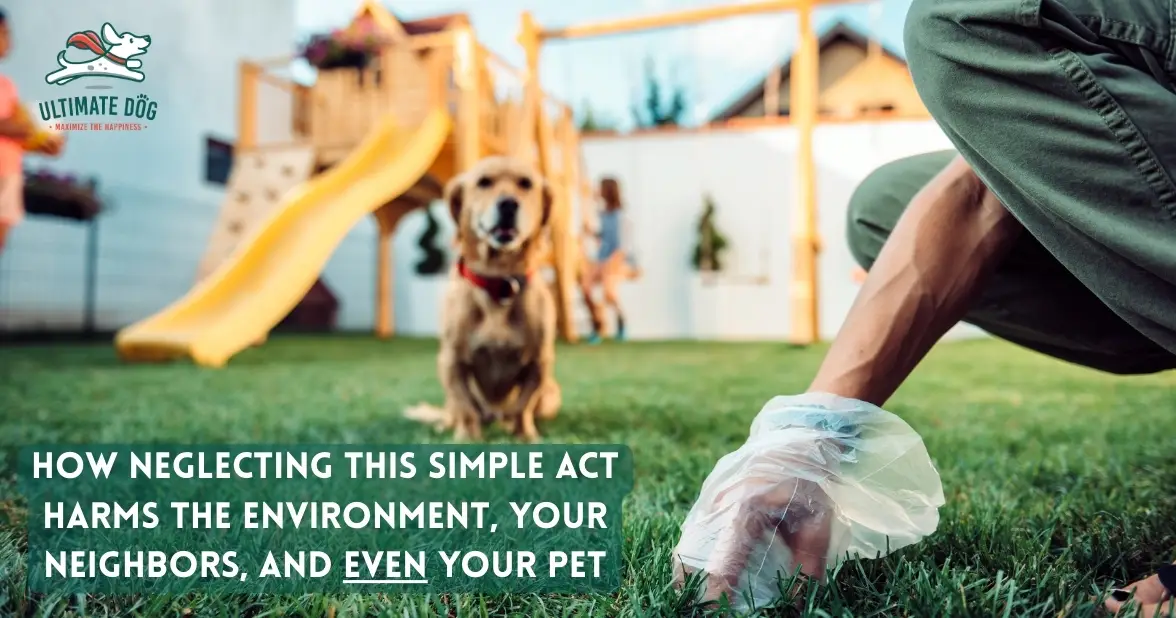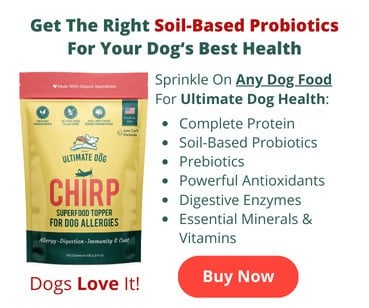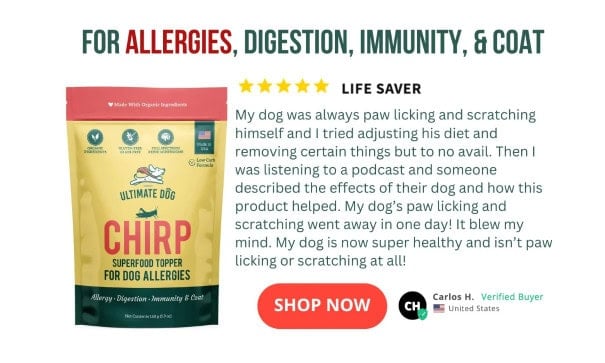|
Getting your Trinity Audio player ready...
|
Very few people out there—I might even venture to say none—enjoy picking up after their dog. But that doesn’t mean you shouldn’t do it. In fact, cleaning up after your dog is one of the most important aspects of responsible pet ownership, not only for your community but also for your dog.
In this article, we’ll look at the consequences of not picking up dog waste, why dog poop and wild animal feces are not the same, and how you can up your scooping game to be a better dog owner, neighbor, and resident of planet Earth.
The Consequences of Failing to Scoop the Poop
What’s the number one reason to pick up after your dog? Easy, poop is disgusting.
But in case that’s not enough to convince you to get out the poop bag and do your duty to clean the duty, here are the many consequences unscooped dog poop has on the environment, public health, and your reputation.
It Hurts the Environment
It should come as no surprise that leaving steaming piles of bacteria-laden poop on the ground has a negative environmental impact. But you might be surprised by how serious that impact is, especially when it comes to protecting water quality, wildlife, and the air.
Dog Poop Causes Waterway Pollution and Algae Blooms
Did you know those piles your dog leaves behind are high in nitrogen and phosphorus? These nutrients contribute to algae blooms in waterways, creating major problems. With the sheer volume of dog poop in urban areas, there’s more than enough to spark ecological imbalance.
You see, when it rains or snows, pet waste—from yards and trails—is washed into creeks and streams, leading to dog waste contamination. As the poop breaks down in the water, it releases nitrogen and phosphorus, which feeds weeds and algae, causing growth imbalances. Too much poop quickly leads to too much growth, which harms waterway ecosystems.
Many invasive plant species require higher than normal amounts of nutrients to thrive. When these conditions are delivered thanks to irresponsible pet owners, these weeds quickly outcompete native flora. Because invasive plants often lack natural predators, once they get a foothold, they quickly take over. This doesn’t just harm native plants; it can have a lasting and negative impact on native fauna that rely on native plants for food and shelter.
Dog Poop Kills Fish and Amphibians
Okay, that might be a little dramatic, but too much dog feces left out to be washed into waterways certainly can kill fish, amphibians, and other animals that call these places home. How does poop do this? In many ways.
Remember those algae blooms caused by excess nitrogen and phosphorus in dog feces? Well, when algae grow out of control like this, it greatly reduces the amount of oxygen in the water. This can suffocate fish and amphibians and cause mass die-offs.
Dog poop can also carry parasites that are harmful to fish and amphibians. But the danger doesn’t stop there. All the toxins we intentionally and unintentionally put into our dogs via low-quality pet food and treats, medicines, and topical treatments come out of them via their back end. In high enough amounts, these toxins can kill insects, amphibians, and fish that call your local river home.
Dog Poop Pollutes the Air
Even if your dog’s poop doesn’t get washed away, it can still harm the environment. As microbes break down poop, they release methane—an awful lot of methane! Just one pound of dog poop left to fester releases nearly two cubic feet of methane.
Methane is bad for the environment in many ways. For one, this gas is incredibly effective at trapping heat. Compared to carbon dioxide, methane’s warming effects are 86 times stronger over twenty years. Methane is a huge driver of climate change, which has already caused immeasurable environmental damage.
Methane is also bad for local air quality because it contributes to ground-level ozone, which can lead to respiratory problems in humans, pets, and wildlife.
It Can Make You and Your Dog Sick
Even if you don’t care about the environment, you must care about your health—or at least your dog’s health. When you fail to scoop the poop, you increase exposure to the health risks of dog waste and dog waste diseases.
Dog Poop Is Crawling with Zoonotic Diseases
A single gram of the average dog’s poop contains about 23 million living bacteria. A frightening percentage of those bacteria are capable of infecting humans and making them sick. I’m talking about Salmonella, E. coli, Giardia, and more deadly and highly unpleasant diseases you do not want to get.
Most healthy dogs can hold an impressive load of these types of bacteria without ever showing symptoms. Humans, on the other hand, are very sensitive to these pathogens, especially children.
When you leave your dog’s steaming pile, you’re basically leaving a time bomb on the ground that may or may not find its way into the hands of an innocent child. And don’t think they have to touch the poop to get sick. Remember how quickly poop finds its way into streams? One swim in that contaminated water could leave a kid violently ill—or worse.
Even if the poop doesn’t get washed away, eventually that bacteria makes its way into the ground. Here, it can be washed into groundwater, dug up during landscaping, or brought home on a new favorite rock.
It’s not just humans who have to worry about these poop bombs, either. Old dogs, puppies, dogs with cancer or compromised immune systems, and even the occasional healthy dog can get sick if they get too close to infected poop. And you know how much dogs love to stick their noses in poop!
Parasites Rely on Unscooped Poop to Find New Hosts
When it comes to your dog, the biggest risk of failing to clean up the yard promptly is parasites.
Hookworms, roundworms, and many other internal parasites use poop as part of their lifecycle. They need poop to find new hosts. But not just any poop will do for this purpose. They need poop from a dog with an irresponsible owner who leaves poop unpicked up long enough for an animal to check it out.
This animal might be the raccoon that lives in your tree, the neighbor’s wandering dog, or your child. It might also be your dog, the one that laid down the parasitic pile in the first place. That’s right, not even the most expensive dewormer stands a chance against a dog who keeps reinfecting themselves thanks to unscooped poop. (Got a feces eater? Find out why dogs eat poop.)
It Will Make You a Pariah
I hope this doesn’t come as a surprise to you, but no one likes the neighbor who doesn’t pick up after their dog.
Whether it’s bombs left to pile up in the yard week after week or the occasional pile left next to the sidewalk, these owners are being judged. Given all that we have covered above, can you blame anyone for thinking less of someone who refuses to pick up after their dog?
Leaving piles behind hurts just about everything—the environment, wildlife, people, kids, and even that person’s own dog. To fail to pick up after your dog is to engage in a highly selfish act. No one benefits from it other than the person doing it, except even they will experience the many negative consequences that come with unscooped poop—the local water and air pollution, the sick wildlife, the judging neighbors…
Not to mention that not picking up after your dog is illegal in most places and can land you a fine of up to $2,000.
Bottom line: just pick up after your dog. You, your dog, and just about every other living thing around you will benefit from your noble sacrifice.
Why Dog Poop Is So Much Worse Than Wild Animal Feces
Why is it that so many people refuse to clean up after their pets? The most common argument I hear is that poop is natural, so why can’t you just leave it on the ground the same way deer and coyotes leave their little presents behind?
This might sound like a logical argument at first, but I promise you it is highly flawed. Here’s how.
#1: Volume
If you look at the number of dogs per square mile in the average suburban neighborhood, you’ll quickly find that the canine population density far outweighs that of any wild mammal in the area. This density only grows when we look at urban environments. When there are this many animals in one place, the amount of poop they produce quickly overwhelms what any natural process can take care of.
In Chicago, for instance, it is estimated that the city’s dogs produce over 68 million pounds of poop per year. Imagine if all of this poop was left on the ground the way “deer poop is.” You wouldn’t even be able to see the sidewalks!
Bottom line: there are too many domestic dogs in the world for us not to clean up after them.
#2: Composition
Even in areas with low dog populations, leaving poop on the ground can quickly cause a poop volume problem. Why? Because the composition of domestic dog poop causes it to take an unnaturally long time to decompose. This is due to the diets we feed our dogs.
Most dogs, unfortunately, eat a highly processed diet filled with additives and fillers. The preservatives and synthetic nutrients in dog food make the poop harder for bacteria and microbes to digest.
This issue is compounded by the fact that dogs create naturally acidic poop, like most carnivores. This not only makes the poop a hotspot for pathogenic bacteria, but it also means it takes longer to break down compared to herbivore poop, which is already halfway decomposed by the time it hits the ground.
Anyone who has transitioned from a processed kibble diet to a raw food diet knows how much faster raw food poop decomposes than kibble poop. But even in this case, it is important to scoop the poop promptly, because raw food poop contains a lot more bacteria (good and bad) than normal dog poop.
#3: Nutrient Makeup
Compared to wild animals, our dogs eat nutrient-dense food. (Don’t confuse nutrient-dense with nutritious—more on that here.)
While all the synthetic vitamins and minerals added to most dog foods do not benefit the dog much, their presence does mean that the dog’s stool has more nutrients in it than the average wild canine stool. This is why dog poop has problematic levels of nitrogen and phosphorus but coyote poop doesn’t.
Commercial dog food is also packed with a lot of fillers that dogs struggle to digest. This means that many of the nutrients that go in, also come out. By contrast, wild animals have evolved to utilize just about every last scrap of nutrition in their natural diets, which means there is little left in their stool.
#4: Contamination
One of the biggest differences between dog poop and wild animal poop is the amount of contaminants.
We’ve already talked about preservatives, synthetic nutrients, and additives—all contaminants you will find in dog poop but not wild animal poop. These compounds are not easily broken down by natural means. So when your dog’s poop does eventually decompose, these substances are left behind to wash into waterways and contaminate soil.
Your dog’s diet isn’t the only source of contaminants that end up in their poop, either. Medicines, including flea and tick treatments, dewormers, chemotherapy drugs, vaccines, NSAIDS, and many others, leak chemicals into your dog’s poop. These substances are far from natural and do not belong in your native ecosystem.
It’s also possible for your dog to pass non-native pathogens through their stool. These bacteria and parasites can come from their diet, trips away from home, or be passed to your dog by you. When these kinds of pathogens are introduced into the native environment via unscooped poop, the consequences can be devastating.
The Right Way to Clean Up
So now that I have (hopefully) convinced you of the importance of cleaning up after your dog, let’s talk about the best way to do it. Here are a few tips for cleaning up right—in all meanings of the word.
- Always Carry Poop Bags – As well as you know your dog, you can’t predict their bowel movements with 100% accuracy. For this reason, it’s best to always carry a roll of poop bags, just in case. If you get caught with your bag roll empty, it is your responsibility to return to the scene of the crime later and clean it up.
- Use Biodegradable Bags When Possible – Will those more expensive biodegradable bags really decompose in the oxygenless environment of the landfill? Probably not. But, they are made without (or with less) petroleum, which makes them much better for the environment. Plant-based plastics, like biodegradable poop bags, also utilize sustainable ingredients, making them an all-around Earth-friendlier choice.
- Pick Up Your Yard Every Day – Or at least once per week. Frequently cleaning of the lawn reduces bacteria growth, soil contamination, the likelihood of nutrient runoff, and parasite reinfestation. Plus your yard will smell a lot better and your neighbors will be much happier with you.
- Don’t Let Your Dog Poop By Waterways – Even when you’re out in nature (or, ESPECIALLY when you’re out in nature), you should pick up after your dog. But if you happen to be camping or otherwise less able to track your dog’s BMs, at least be mindful of keeping them away from waterways.
- Feed Better Food – The low-quality, synthetic ingredients in dog food are a big reason why your dog’s poop poses such a threat to the environment. Upgrading your dog’s diet to a raw option not only reduces their feces risk but will also help them to be healthier and happier. (But please, still scoop the poop!)
The Final Scoop on Scooping the Poop
There are a lot of great reasons to pick up after your dog, whether in your yard or out in public. Not only is dog poop unsightly, but it’s also bad for the environment, potentially dangerous to humans, dogs, and other animals, and well, there’s no way to put this lightly, you just look selfish when you fail to scoop the poop.
Sources
Carrington, D. (2022, February 7). Deluge of dog pee and poo harming nature reserves, study suggests. The Guardian.
Cinquepalmi, V., Monno, R., Fumarola, L., Ventrella, G., Calia, C., Greco, M., De Vito, D., & Soleo, L. (2012). Environmental contamination by dog’s faeces: a public health problem? International Journal of Environmental Research and Public Health, 10(1), 72–84.
Dog waste pollution — Think Blue Maine. (n.d.). Think Blue Maine.
FAQs • Bothell WA • CivicEngage. (n.d.).
Mernit, J. L. (2014, November 3). Just how bad is your dog for the environment? – Los Angeles Times. Los Angeles Times.
Methane | Climate & Clean Air Coalition. (n.d.).
PET waste- Stormwater Pollution Prevention — Salt Lake County Stormwater Coalition. (n.d.). Salt Lake County Stormwater Coalition.
WHAT’S WRONG WITH DOG POOP? (n.d.). Government of Borough of Hanover. Retrieved April 29, 2025

Sara Seitz worked in the pet industry for over a decade. In addition to being a certified dog trainer, Sara gained experience working as the general manager of a dog daycare and boarding facility, as the creator and manager of a pet sitting company, as a groomer, and as a dog behavior evaluator. She also has a bachelors in animal behavior from CSU. Currently, Sara works as a freelance writer specializing in blog, article and content writing.





Leave a Comment